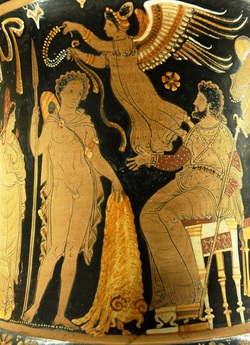PELIAS

Pelias receives Golden Fleece, 340-330 BCE
S. A. Scull
Greek Mythology Systematized (1880)
Poseidon visited Tyro as the river-god Enipeus, and she became the mother of Neleus and Pelias. She exposed her children, but they were saved and reared by some countrymen. Cretheus, king of Iolcos, married Tyro, who bore a son, Aeson. At the death of Cretheus, Neleus and Pelias usurped the throne; then Pelias expelled his brother Neleus, who went to Pylos (Triphylia). Neleus married Chloris (daughter of Amphione). When Heracles had slain Iphitus in a fit of madness, he went to Neleus to be purified, but as the latter was a friend of Eurytus, the father of Iphitus, he refused to grant the request. Heracles then made war on Neleus, and slew all his sons but Nestor.
In the [above] account of Neleus we learned that he and Pelias had usurped the throne of Iolcos, to the exclusion of Aeson; also, that Pelias then usurped sole authority. After Pelias had reigned many years, Jason, son of Aeson, came to Iolcos and claimed the throne. Instead of forcibly resisting this claim, Pelias sought to divert Jason from his purpose by proposing that he bring from Colchis the Golden Fleece, and thus originated that expedition so well known in literature and in art as the Argonautic Expedition.
Jason returned from that expedition, and Pelias met with a terrible fate. His daughters had been told by Medea that if they would cut their father in pieces and boil them, they would thus ensure his restoration to youth, and they acted upon the horrible suggestion. Acastus, his son, expelled Jason, and Medea instituted funeral games in honor of Pelias. Alcestis, so nobly distinguished for her heroic devotion to Admetus, was a daughter of Pelias.
Source: S. A. Scull, Greek Mythology Systematized (Philadelphia: Porter & Coates, 1880).
Photo credit: Wikimedia Commons.



